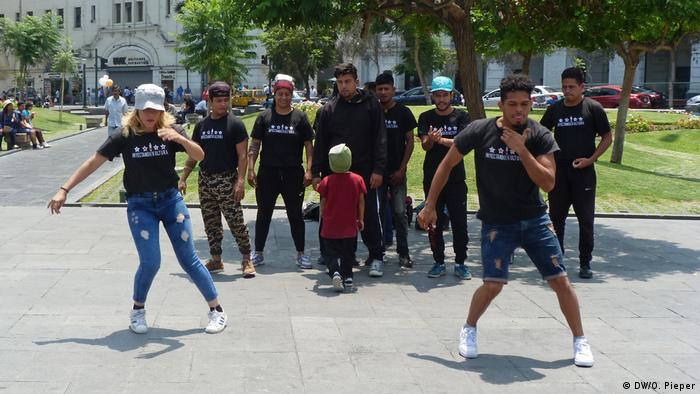Ecuador demands recently, a certificate of good conduct, Colombia has suspended the issuance of residence permits since mid-December. Many of the refugees from Venezuela, looking for your happiness, therefore, in Peru.

Who is watching in the blazing midday sun of Lima, and the Venezuelan Hip-Hop dancers in their Moves on the Plaza San Martín and then talks to you, learns one thing pretty quickly: It helps to emigrating there, where there is already a network. A group is also in the bad times, and Sport is one of the best ways, the Stress of the flight to reduce. Or as Francisco Díaz puts it: “When I dance, I can switch off and all forget my problems. I can feel the energy through my body and I’m just fine.”
“Inyectando Kultura” on the black T-Shirt from Francisco and the other dancers, culture is to be injected – a project that has caused the 31-year-old former dance teacher ten years ago in Venezuela, to spread the Hip-Hop culture. “In Latin America, this dance has a very bad Image. And we want to show that it is something Positive”.
The mood in Peru is tilted
In Venezuela, it came to Hip-Hop of drugs and with optimism to look forward to get away. Now, in Peru, it is still more than the. “Inyectando Kultura” has led the Venezuelan refugees in Lima together again, was a point of contact for the dancers, who did not know where they should after their flight from Venezuela.

The Hip-Hop dancers, Francisco Díaz, and Miguel Flores, at the Plaza San Martín in Lima
Francisco Díaz came in 2017 as the first of the group to Peru. The traffic lights jump to Red, he begins to dance, in the hope that a few Soles, the Peruvian currency. “At the time, the mood was very different: people have asked you how you mean, you have you motivated the whole time and you a lot of courage, that we can do that,” recalls Diaz.
Today, with hundreds of thousands of Venezuelans in Lima, is the different. “The atmosphere is tilted. We are often looked at evil and we need to listen to a lot of stupid sayings. It is now even harder to make ends meet, because we have to get to the traffic lights as much money as before.” Díaz has made up for his wife and his little son from Venezuela; they often dance to third at the intersections of the Peruvian capital.
Return? For the time being not an issue
Miguel Flores has participated in Venezuela at the “Inyectando Kultura”, the 28-Year-old was in Venezuela a dance teacher. By the end of 2018, he followed the call of his buddies Francisco. A Robbery in the home brought in Flores, the last straw. “When I came out of Uni, have you tried to steal my phone. Because I resisted, they shot me. That was the Moment where I said, now it’s enough.”

The Venezuelan dancers of the “Inyectando Kultura” in their new home in Peru
Now you are with “Inyectando Kultura” to tithe in Lima. You live together, help each other, and occur also as a group on places. Every couple of weeks to send money home to their families. “My mother writes to me every day that I have to return to Venezuela,” said Miguel Flores, “and I answer: ‘Well, I’ll come back, and then? What am I supposed to live, what should I eat?‘”
From country of Emigration to country of Immigration
Federico Agusti was for many years the immigration authorities in Argentina, since a few weeks, he is the head of the refugee Agency of the United Nations, UNHCR, in Lima. The lawyer says Peru had transformed quickly from a country of emigrants to a country of immigrants. “And there were no institutions here, the experience with the theme of escape had,” said Agusti.

Federico Agusti, Director of the refugee Agency of the United Nations in Lima: “Peru is generous”
715.000 Venezuelans living in Peru, the country is Colombia, goal number two for the refugees. Agusti has a simple justification: “Peru is the issue of refugees is very generous, and still has a policy of open doors.”
Whilst it was, for example, in Argentina or Uruguay, even easier, to get a residence permit, explained Agusti, “but many Venezuelans are reluctant because it is far and expensive. Since you prefer to stay in Peru, which is located relatively close to their home.”
Agusti is working with the Peruvian authorities to provide the Venezuelans in Peru, a perspective. This is not easy: “Two out of three Peruvians work in the informal sector. And now, hundreds of thousands of Venezuelans, of which almost all in the informal sector have worked with.”
Pages 1 | 2 | full article